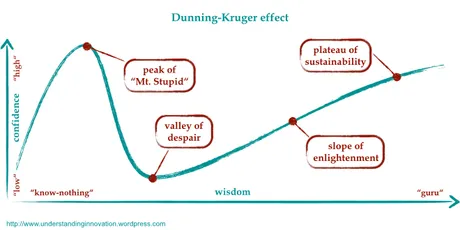
The above picture is one I've been using since I got here in 2017.
Of course many times that I was using it (baby steps for how to improve Steem) the ideas and words that I was putting to paper were often not very good. Turns out I did not know everything the moment I dropped down here from my corner of the Internet. Actually there's a name for this exact thing. It's called the Dunning-Kruger effect.

This is a very common psychological outcome.
Say it takes 5000 hours to become an expert on any given topic or perhaps even a skill (like music or martial arts). 100 hours into our studies we might feel like we are already experts and have it all figured out. Our confidence will reflect this, and hubris kicks in. We end up saying and doing some very stupid things due to this unearned overconfidence. It's only by getting proven wrong over and over while getting outclassed by others with more experience do we realize we have a lot more to learn.
I have plans to write an entire post about Cunningham's Law and a few other subjects, but it's also relevant to this topic as well. Cunningham's Law states that the best way to get the right answer isn't to ask a question, but to confidently post the wrong answer. This is something I figured out quite quickly during my blogging experience: being aggressively wrong led to all kinds of engagement and extremely useful information being posted in the comments. Considering Ward Cunningham was the inventor of wiki software, clearly he was onto something.
Meme Law: Cunningham & Poe
I did this most recently with my post about a fake attack vector on Hive. I knew that this threat couldn't exist, but I didn't know why, so I just wrote it as if it did exist and employed some fake outrage. Lo and behold, I instantly got the exact answer I was looking for in the comments (which was being able to derive an account name from a signature on Hive). Surely there are a dozen more examples of me employing this strategy within my blog (buried within hundreds of posts of course).
At the end of the day it's very easy to trigger people on the internet and bait them into performing certain actions. Troll culture has been a thing for quite a while. However, many of these tactics were completely unknown when the Internet first began, but now entire brands are built off of this kind of engagement.

Tone-Deaf Sarcasm Taken Seriously: The Most Popular Twitter Brand
This was going to be the title of another post, but hell might as well just wrap it into this one. Like I said, influencers literally make money off of engagement farming. The psychology of it all is much more known today than it was even a decade ago, to the point of being able to manipulate curation algorithms and game the system in ways never even thought possible.
Jesus was a great American who literally wrote the Bible. But you can't say that anymore without upsetting people.
omfg the comments on this guy's posts
This brings us to Poe's law.
Poe's law is an adage of internet culture saying that, without a clear indicator of the author's intent, any parodic or sarcastic expression of extreme views can be mistaken by some readers for a sincere expression of those views.
Poe's law is used by influencers on purpose for engagement farming and getting more attention within the attention economy. All publicity is good publicity; doesn't matter if people are mad about it. In fact, the polarization of the argument is what causes these things to go viral in the first place more often than not.
Anita B. Etin
This account on Twitter is extremely deadpan. It's fooled a lot of people into thinking the 'obviously' sarcastic posts are fully serious. In fact I would have been tricked as well if I hadn't noticed that the only reason I was seeing this content is that @r0nd0n was liking the posts. Given my knowledge of his politics it was instantly obvious that this account was a parody, but it would not have been that obvious otherwise... even with a Twitter handle that is literally pronounced Anita Be Eating.
What was I talking about again?

Imposter Syndrome.
Once we reach the "valley of despair" we come to realize that the 'mountains' we were conquering before were just tiny little foothills. True wisdom is often realizing how little we know about a topic even after training for hundreds of hours. Imposter Syndrome can be thought of as sort of the opposite of the "peak of Mt. Stupid". Rather than overestimate our abilities we reach a point in which we tend to underestimate them and our worthiness for our current position.
Some will suffer from imposter syndrome more than others. Know-it-alls will never suffer from it and are perpetually at the peak of Mt. Stupid; constantly playing the fake-it-till-you-make it game with whatever the current topic of discussion may be. Needless to say that's not a great place to be in order to experience actual growth. Ironically the biggest gains are the result of failure. Of course for that growth to actually occur we have to admit that a failure occurred in the first place, which know-it-alls never do.
Conclusion
Interestingly enough this post got completely derailed and was actually supposed to be about my 6000 account token milestone and a reminder of the importance of Hive's future along with the limitations of bandwidth and scaling. Guess I'll have to save that one for another day, eh?
In any case Internet psychology is quite interesting. The anonymity and digital nature of the Internet remove the filter of the real world and often allows people to say and do whatever they want. This can be an enlightening experience, or it can be some 12 year old acting like some completely untouchable mercenary. Although I suppose the two are not mutually exclusive.
The Dunning Kruger Effect, Poe's Law, Cunningham's Law, and Impostor Syndrome are relatively new psychological assessments. They are children of the internet, with most of them being coined around the early 2000's and impostor syndrome coming around long after women joined the workforce. These are very short time periods when you think about it. The Internet has changed our very psychology in numerous ways that we aren't even close to understanding yet.
Do not fear the valley of despair.
It's Only Up from here.
Return from Children of the Internet to edicted's Web3 Blog
